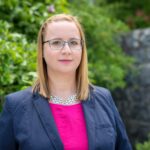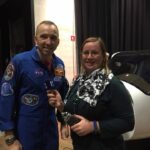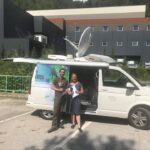The following information and answers were submitted by Metka Pirc from Slovenia. She is an incoming Central and Eastern European Journalism Program (CEEJ) Fellow. The CEEJ program was postponed and the fellows will be arriving in the U.S. to begin their fellowship in the spring. Until then they will be participating in a webinar series and will be highlighted through a CEEJ blog post series. Q&A Series with CEEJ Fellows Pt 9: Metka Pirc

What is your topic or content interest and why?
I work for the public radio and a television broadcaster RTV Slovenia, reporting from the regions of Velenje and Koroška. I used to work at the national TV, as I have been working for one of our largest national newspapers, but my primary interest is radio. I am fond of working on the radio, for it brings me personal joy and satisfaction. As regards the topics, the energetics are leaving their footprint in the regions that I am covering. The last Slovenian thermal power plant station is situated in Šoštanj, where they are trying to find new resources, as the coal power source is running out and won’t be available for much longer.
What brought you to the area of journalism, what made you want to become a journalist, is there someone that inspired you?
I got my first glimpse of journalism in elementary school. I “worked” for the school radio and I liked to ask questions. Then, I just continued working up to this day. If you truly enjoy your work, time flies and you don’t even notice it.
Why does journalism matter?

In times, when it seems, that fake news is trying to occupy public space and the audience, journalism matters the most. I see the extremely important role of public service media as a symbol of balanced journalism.
What is your primary challenge as a journalist in your country?
Independent journalism in Slovenia is at the breaking point, I think. EFJ already expressed their concerns about the severity of the developments in Slovenia, where freedom of expression and personal safety of journalists are in danger.
What is your current understanding of freedom of the press or what it might look like in your country?
It is important that a journalist is not exposed to pressure and censorship, that he is allowed to do his job correctly and professionally, and at the same time, in the vast flood of different media, he must be aware that a journalist cannot be everyone, that he must follow journalistic standards and principles, so-called journalistic code of conduct. Furthermore, he is obliged to be honest with the media, with his listeners and with the public.
What is the one thing you are most looking forward to during your program in the U.S.?
 I want to learn about American radio aesthetics and different approaches to news reporting. I want to talk to my American peers, learn about their experiences and improve my digital skills. As a radio host, I ‘ve learned to be curious and an active listener, and this will help me ask relevant questions. Also, I think the program will serve as a good motivation in these difficult and unprecedented times.
I want to learn about American radio aesthetics and different approaches to news reporting. I want to talk to my American peers, learn about their experiences and improve my digital skills. As a radio host, I ‘ve learned to be curious and an active listener, and this will help me ask relevant questions. Also, I think the program will serve as a good motivation in these difficult and unprecedented times.
What are some of the things that have colored your impression of the U.S.?
Given that I come from a former transition country, I have always been fascinated by America, both in terms of the ideal capitalist system – at least up until 2008 – and in terms of the size of the country. I come from a country with merely 2 million inhabitants. At the same time, it always arouses my curiosity about how the media finds itself in front of such a mass audience. On the other hand, it seems to me that the polarization of society is visible in both America and Slovenia, which again brings new challenges and questions.
What are you hoping to accomplish with this fellowship?
I very much look forward to building new relationships with international colleagues. I got inspired for this fellowship by fellow colleagues from RTV Slovenia who were already given and took the opportunity to work abroad, so I know how important it is to share the experience with my peers.















